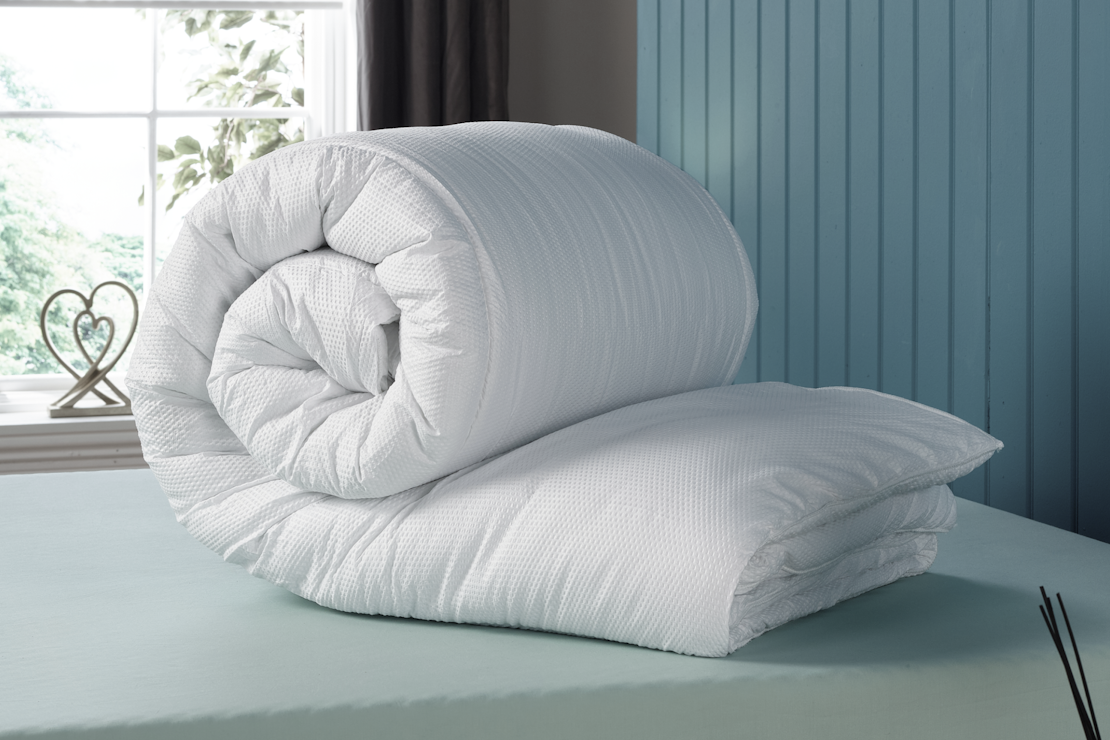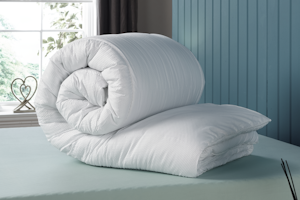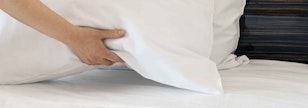20 Mar 2025

How Often Should You Clean Your Duvet?
25 Oct 2024
Your duvet provides comfort and warmth night after night, but have you ever wondered how often you should clean it? A clean duvet is essential for maintaining a healthy sleep environment and prolonging the life of your bedding. Most experts recommend washing your duvet at least once per year, but more frequent cleaning may be necessary depending on your usage and circumstances.
Many people overlook their duvets when it comes to regular bedding maintenance. Unlike sheets and pillowcases that are washed weekly, duvets often go unnoticed. However, they can accumulate dust, dead skin cells, and sweat over time. If you use your duvet year-round or have allergies, you might benefit from washing it every 3-4 months.
Proper duvet care involves more than just washing. It's crucial to check the care label for specific instructions, as some duvets may require professional cleaning. When washing at home, use a large-capacity machine and gentle detergent. Thoroughly drying your duvet is equally important to prevent mould and mildew growth.
Key Takeaways
- Wash your duvet at least annually, or every 3-4 months for year-round use
- Check care labels and use appropriate washing methods for your duvet type
- Ensure thorough drying to maintain duvet cleanliness and prevent mould growth
Understanding Duvet Usage
Proper duvet care depends on how you use it and the environment it's exposed to. Recognising when your duvet needs cleaning is crucial for maintaining a hygienic sleep space.
Factors Affecting Cleaning Frequency
Your duvet's cleaning needs vary based on several factors. If you use a duvet cover, you can wash it less frequently than if you use the duvet directly on your bed. Seasonal use also impacts cleaning schedules - a duvet used year-round requires more frequent washing than one used only in winter.
Your sleeping habits play a role too. Night sweaters may need to clean their duvets more often. Pets in the bed increase the need for cleaning due to dander and fur. Allergies are another consideration; allergy sufferers should wash their duvets more frequently to reduce allergen build-up.
Climate affects duvet cleanliness as well. Humid environments can lead to faster accumulation of dust mites and mould, necessitating more frequent cleaning.
Signs Your Duvet Needs Cleaning
Watch for visual cues that signal it's time to clean your duvet. Visible stains, especially from spills or bodily fluids, warrant immediate attention. Discolouration or yellowing of the fabric is another clear indicator.
Odours are a telltale sign. If your duvet smells musty or unpleasant, it's overdue for a wash. Pay attention to any changes in the duvet's loft or fluffiness. If it appears flat or lumpy, cleaning can help restore its shape.
Increased allergy symptoms while in bed might indicate a build-up of allergens in your duvet. Itching, sneezing, or worsened asthma symptoms are red flags. If you notice dust when you shake your duvet, it's definitely time for a thorough clean.
Recommended Cleaning Schedule
A proper cleaning schedule keeps your duvet fresh and hygienic. Regular maintenance and seasonal deep cleaning ensure your bedding stays in top condition.
Regular Maintenance
Vacuum your duvet weekly to remove dust and allergens. Use the upholstery attachment on low suction to avoid damaging the fabric. Spot clean any small stains immediately with a gentle detergent and cold water.
Air your duvet outside on a sunny day every few weeks. This helps eliminate odours and moisture. Fluff and rotate your duvet weekly to maintain its loft and prevent clumping.
Change your duvet cover weekly. Wash it at 60°C to kill bacteria and remove sweat effectively. For silk covers, use a 30°C cycle with mild detergent.
Seasonal Cleaning
Wash your duvet every 3-4 months if used year-round. For those with allergies, more frequent washing may be beneficial. Always check the care label for specific instructions.
Use a large capacity washing machine or take it to a launderette. Wash at the highest temperature recommended on the label, typically 60°C for synthetic duvets. Use a gentle, non-bio detergent and an extra rinse cycle.
Dry thoroughly in a large capacity dryer on low heat. Add dryer balls to maintain fluffiness. Alternatively, air dry outside on a sunny day, turning it regularly.
For down duvets, professional cleaning once a year is recommended to maintain their quality and longevity.
Best Practices for Duvet Cleaning
Proper duvet cleaning ensures a hygienic and comfortable sleeping environment. Regular maintenance and appropriate cleaning methods can extend the life of your duvet and improve sleep quality.
Choosing the Right Cleaning Method
Check the care label on your duvet before cleaning. Synthetic duvets are often machine-washable, whilst down or feather duvets may require special care. For machine-washable duvets, use a gentle cycle with mild detergent. Add tennis balls to the dryer to prevent clumping.
Natural duvets filled with wool or silk typically need dry cleaning. If your duvet is too large for your home washing machine, consider taking it to a launderette with industrial-sized machines.
For spot cleaning, use a damp cloth with mild soap to gently dab the affected area. Avoid rubbing, as this can spread the stain and damage the fabric.
Tips for Washing Duvets at Home
When washing your duvet at home, use a large-capacity machine to ensure proper cleaning. Remove the duvet cover and wash it separately. Pre-treat any stains before washing.
Use warm water (30-40°C) and a gentle detergent. Avoid fabric softeners, as they can leave a residue and reduce the duvet's breathability. Run an extra rinse cycle to remove all soap.
Dry the duvet thoroughly to prevent mould growth. Use a low heat setting and remove it periodically to fluff and redistribute the filling. Ensure it's completely dry before use.
Professional Cleaning Options
Professional cleaning is ideal for delicate duvets or those too large for home washing. Dry cleaning is often recommended for down, feather, or silk-filled duvets. This method effectively removes dirt and allergens without damaging the filling.
Some professional cleaners offer specialised duvet cleaning services. These may include sanitising treatments to eliminate dust mites and bacteria. Whilst more expensive than home cleaning, professional services can extend your duvet's lifespan.
Before choosing a cleaner, ask about their experience with duvets and any guarantees they offer. Ensure they use appropriate cleaning methods for your duvet's material.


